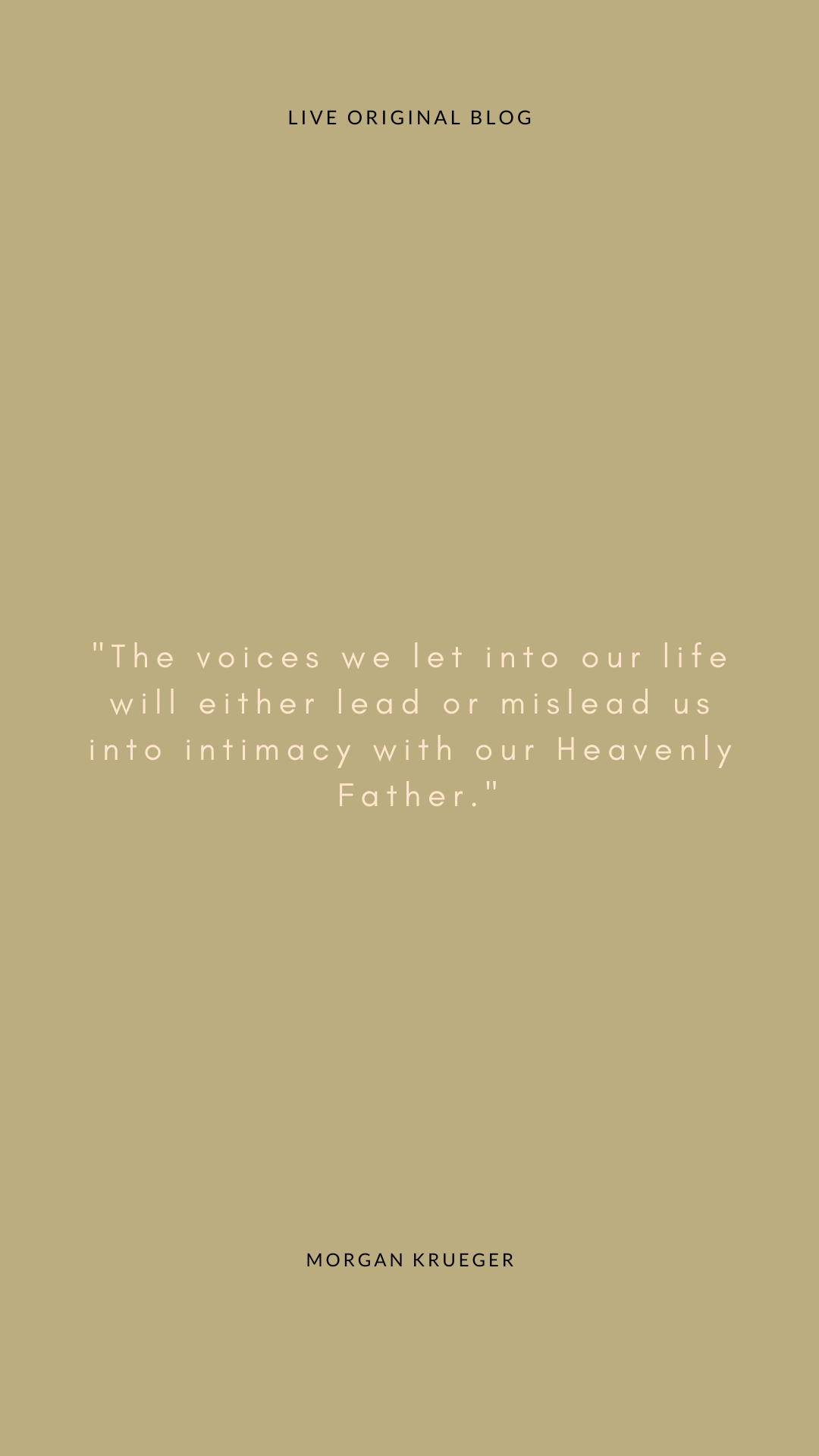
by Morgan Krueger | Jun 18, 2024 | Featured, Life Advice
I remember one of the first children’s Christian hymns I ever learned in Sunday school. Maybe you know it, too. It goes like this:
Jesus loves me, this I know,
for the Bible tells me so.
Little ones to him belong;
They are weak, but He is strong.
I can still hear my Sunday school class sing this song all together. I sang with such confidence that it was true. I just loved it, and I loved the lyrics. I mean, who doesn’t love being loved? I sure do. I’m guessing you do, too. We all have this desire to be seen, known, and loved.
As we get older and experience more life, opening ourselves up to love can feel absolutely terrifying over time. As Tim Keller explains, “To be loved but not known is comforting but superficial. To be known and not loved is our greatest fear. But to be fully known and truly loved is, well, a lot like being loved by God. It is what we need more than anything.”
Although I didn’t fully grasp how true these lyrics were at five years old in my Sunday school class, I understand now that the Bible actually does tell us so. The Word of God is full of Jesus’ love for us. And we discover the depth of love Jesus has for us, only then can we begin to open ourselves up to being known and loved by another human being. Jesus first, relationships second. Always.
In John 4, we meet a sweet friend who was looking for water, but needing so much more. We don’t know her name, but we learn a lot about her and Jesus from this conversation surrounding a water source:
A woman from Samaria came to draw water. Jesus said to her, “Give me a drink.” (For his disciples had gone away into the city to buy food.) The Samaritan woman said to him, “How is it that you, a Jew, ask for a drink from me, a woman of Samaria?” (For the Jews had no dealings with Samaritans.) Jesus answered her, “If you know the gift of God, and who it is that is saying to you, ‘Give me a drink,’ you would have asked him, and he would have given you living water.” (John 4:7–10)
That’s only the beginning of her interaction with Jesus. I encourage you to read the rest of her beautiful story in John 4:11–30. But here’s what we learn about her from her time with Jesus.
She was culturally seen as “lesser than” because she was a Samaritan. Being one meant that she was generally hated by Jews for religious and racial reasons. On top of that, Samaritans were known for having unstable theological beliefs, not fully rooted in Scripture. All of this is the perfect storm for prejudice and cultural tension between these two people groups.
Also, she struggled with shame and isolation. We see in verse six that she came at the “sixth hour,” meaning around noon. Culturally, women would travel in groups in the early morning hours (the coolest time of the day) to draw water from the well. But our friend not only showed up at the hottest hour of the day, but she also came alone.
When we feel shame, we pull away from God and from others. Isolation is one of the biggest tools the enemy uses to keep us in our thought patterns of shame, guilt, and regret. That’s where we find her. That’s right where Jesus found her. And He had something to say about it.
Lastly, she had a questionable past when it came to relationships. “The woman answered him, ‘I have no husband.’ Jesus said to her, ‘You are right in saying, “I have no husband” for you have had five husbands, and the one you now have is not your husband. What you have said is true’” (John 4:17–18).
When we’re not rooted in Jesus, we have no idea what to look for. Our friend here had men give her attention, maybe even fulfill certain desires that she had (to be loved, to be taken care of, to be seen), but she was never truly satisfied because no man could ever give her what she truly longed for. She was looking for a love that stayed. A love that wasn’t based on emotions and feelings but on commitment and Christ. She was looking for living water. And although she hadn’t yet found it, the Living Water found her.
Here’s what we learn about Jesus.
Jesus will take the unlikely path to pursue you. Because of the cultural hostility that the Jews had toward Samaritans, Jewish people typically didn’t travel through Samaria when going from Judea to Galilee. Culturally, the hate was so real that they took the long route just to avoid the entire town. The tension was also real. But see here that Jesus didn’t take the path most others took. Instead, verse 4 says, “And he had to pass through Samaria.” This was a “had to” not out of a place of obligation or expectation but out of necessity to reach her.
Jesus will take any route He needs to take to get to your heart and your hurts. Not only did He take the unlikely route here, but He also waited for her. We see here that Jesus is willing, able, and eager to wait for us. Just like He was with this woman, He’s abundantly patient and never late for an encounter with His children.
Next, Jesus will break any barrier to pursue you. In that day, it’s important that we understand the role that women played in society. They were seen as the lowest class. On top of being not just a Samaritan, but a Samaritan woman, sister-friend didn’t have a whole lot going for her. But we see here that Jesus wasn’t too concerned with cultural barriers when it came to pursuing those He was after.
“Jesus said to her, ‘Give me a drink’” (John 4:7). Not only did Jesus speak to her, but He humbled Himself to ask her for something. He knew they were going to have a hard conversation, and He wanted her to know that she had a Savior that wasn’t afraid to get on her level and meet her where she was.
Lastly, Jesus will enter into your mess to pursue you. Are there parts of your life that just feel messy? Unhinged? Falling apart? Me, too. Same for our friend here. She had parts of her life that she would probably do anything to hide. But Jesus wasn’t afraid of those areas. On the contrary, those were the exact areas He was excited to dig into with her.
I’m not proud of this, but I’m a pretty messy person by nature. I remember when Ryan and I were engaged, so many people would warn me that living with a boy is messy and that I better prepare myself. I rarely commented back, but I always remember thinking, Actually, I feel bad for Ryan that he has to live with me. Yes, I am the messy one in our marriage.
One of the main messes that I make is what I like to call “my piles.” If you are a pile maker, you know what these are. They are piles of clothes. After trying on multiple outfits a day, I will form a pile in a corner of our room instead of hanging those clothes up. It’s become a running joke because if Ryan sees a pile, he can’t understand how it could be anything but dirty clothes. But with lots of patience, I explain to him that there is a difference between a clean pile and a dirty pile. In fact, most of my piles are clean! Men, right?! Just kidding! It’s a real problem, and I’m working on it 😉
I think sometimes we also compartmentalize the messy part of our lives. We have the “not so bad piles,” the “dirty piles,” and even the “looks clean on the outside piles.” But at the end of the day, a pile is a pile. And Jesus came to enter into our piles, no matter how dirty or put together they may seem. If something isn’t where He calls it to be, He will enter in and address it—even the piles we’re afraid for anyone to see.
That’s what He did here with our friend at the well. He wasn’t afraid to have the hard conversations about her relationships. He addressed the reality of her past without judgment or heaping shame onto her. Just like her pile of past broken relationships, we each have hard areas that Jesus is sitting, waiting, and ready to be welcomed in.
Friend, Jesus will never enter a situation that He doesn’t fully plan to redeem. His pursuit always has purpose. Let Him into the hard piles, the messy piles, and even the piles you’ve come to accept, and watch what He’ll do. This is the best kind of loved. Fully seen, fully known, fully loved.
Morgan Krueger is a Jesus follower, wife, mother, and author who found her voice connecting with women seeking freedom from the brokenness of past shame. Passionate about the redemption found in following Jesus, Morgan aims to keep that at the center of all she does. Morgan works at Faithfully Restored, a ministry that offers the hope of Jesus in the midst of suffering. Her first book, Goodbye Hiding, Hello Freedom: Trading Your Shame for Redemption in Jesus, releases in September 2024.
In her downtime, you can find Morgan enjoying the significance of the mundane, including spending time with her two sons, encouraging women through words, and watching British baking shows with her husband, Ryan, in Franklin, TN. You can connect with her on Instagram @morganwkrueger and at morgankrueger.com.
by Morgan Krueger | Dec 8, 2022 | Wisdom |
Around the holiday season, there are two types of people. Those who put their tree up before Thanksgiving and those who wait until after. It’s really funny to see how the people who wait until after are incredibly proud of their act of self-control. And the ones who pull the trigger before Thanksgiving seem to be even more proud of their Christmas cheer singing loud for all to hear.
As I’m not above any of it, I am proud to say that in the Krueger household, our humble 7-foot artificial tree that Ryan and I have had since our first year of marriage is always up before we head out of town for Thanksgiving. Yes, we are those people. If you don’t like it, I hope we can look past our differences in the name of all that is merry and bright. Regardless of who you are, I think we can agree that, for one reason or another, we all love Christmas.
What’s not to love? The lights, the trees, the shows, the food, the parties, the gifts, the music, the movies, the fellowship. The list goes on and on, just like our amazon wish lists. And who doesn’t love their friend’s annual Christmas cookie party?
Beyond all of the festive hype of Christmas, I believe there’s a desperation for the holiday season that goes deeper than just gifts and lights. It’s an eagerness of soul, a longing, and an anticipation that there might just be something fulfilled that our hearts search for during this time.
2,000+ years ago, before Christmas lights and caroling even existed, the origin of why we celebrate centered around only one thing: a desperation for the coming King. It’s the heart of advent, which literally translates “arrival” or “coming”.
On the night of Jesus’ birth, a heavenly host of angels gloriously broke onto the scene before an unlikely group of people that we read about in Luke 2:8-20:
“And in the same region there were shepherds out in the field, keeping watch over their flock by night. And an angel of the Lord appeared to them, and the glory of the Lord shone around them, and they were filled with great fear. And the angel said to them, “Fear not, for behold, I bring you good news of great joy that will be for all the people. For unto you is born this day in the city of David a Savior, who is Christ the Lord. And this will be a sign for you: you will find a baby wrapped in swaddling cloths and lying in a manger.” And suddenly there was with the angel a multitude of the heavenly host praising God and saying, “Glory to Go in the highest, and on earth peace among those with whom he is pleased!”
When the angels went away from them into heaven, the shepherds said to one another, “Let us go over to Bethlehem and see this thing that has happened, which the Lord has made known to us.” And they went with haste and found Mary and Joseph, and the baby lying in a manger. And when they saw it, they made known the saying that had been told them concerning this child. And all who heard it wondered at what the shepherds told them. But Mary treasured up all these things, pondering them in her heart. And the shepherds returned, glorifying and praising God for all they had heard and seen, as it had been told them.”
Have you ever thought about the fact that Jesus, being God incarnate, was fully sovereign and in control over every detail of His birth?
In February of this year, Ryan and I welcomed our first child, a son, into this world. Our baby, Graham, was a beautiful picture of the faithfulness of God in our lives and we couldn’t wait to tell those we loved that he was finally here. But there was an order to his birth announcement. We started with our immediate family, then extended family, then close friends, then other good friends, and then finally made an announcement on social media. We think Graham is pretty great, but not so great that he would have the ability to control the news of his arrival or any other detail of his birth for that matter. But the baby in a manger, Jesus, actually did have full control over His.
Jesus, the long-awaited savior-King, could have sent the angels to ANYONE to give the good news of great joy. And who did He send them to first? The shepherds.
At that time, shepherds were regarded at the very bottom of the Palestinian social ladder, right there with the tax collectors and those who cleaned up literal waste. They held a reputation of “incompetence”, to the point where it was stated that if one were to a fall into a pit, no one should feel obligated to pull them out. Sheesh. Talk about a tough go.
But in Jesus’ upside-down Kingdom, they were the perfect audience to receive the invitation to first behold His glory.
So why the shepherds? Jesus wanted to start his life the same way that he would end it – by coming to seek and save that which is lost (Luke 19:10).
The shepherds had nothing in their own merit or reputation to cling to. They knew they were depraved. They were okay to show their need. And because of that, they weren’t afraid to be desperate for that which could save, redeem, free, and heal.
Just as there are two types of people during the holiday season, they are also two types of people in the gospel story, both in which need saving: those who know it and those who don’t.
When it comes to the birth of Jesus, we will never care about it unless we see that we are those in which He came for. We are those that need saving this Christmas. Not just for the neighbor that drives you crazy. Not just for the friend that has hurt you. Not just for the significant other that you wish put you first more. Jesus came for me. Jesus came for you. We are the people who desperately need saving this year.
So, when the shepherds heard of the Good News, what did they do? They responded in their desperation. Luke’s account of the story tells us that they responded with “Let us now go”and then they “went with haste”.
After years of longing for a Savior, the silence was broken on this dark night in Bethlehem. And the shepherds traveled far and wide not for worldly gain, but for just a glimpse of Emmanuel – God with us.
The posture of the shepherds thousands of years ago shows us what the advent season is supposed to stir in us today: an awareness of our need for saving, and an awakened desperation for the presence of our Savior.
So my question is this: Are we as desperate for Jesus as we are for the Christmas parties, the presents, and another year of our favorite holiday traditions?
I don’t know about you, but for me, I could easily fill this month with some of the best things: friends, family, gift giving, volunteer opportunities, Christmas Eve services, advent devotionals, lights, hot cocoa, celebrating my baby’s first Christmas, photo ops, Christmas cards, extra rest, you name it….. and I could still miss it. I could miss the wonder, the awe, the haste, the urgency, the longing, and the desperation for the origin of the Christmas story: Jesus. Let’s not miss it this year.
This advent season, let us see ourselves as shepherds, full of lack and with nothing to boast in but Christ. Let us remember the goodness of God in the past to send us His son to be born, live the perfect life we could never live, and to die a death that we deserved… all to set us free from sin and death. And let us look ahead to the promise that one day He will return and bring it all to peace.
He will right every wrong.
He will heal every sickness.
He will wipe every tear.
He will welcome every outcast.
He will free everyone stuck in shame.
He will redeem all brokenness.
I pray it’s such a wonderful holiday season for you. I pray you laugh, drink all the hot cocoa, see all the lights, watch all the classic movies, attend all the festive parties, kiss under the mistletoe, and soak in all the music, fellowship, and chats around the fire. But above all, I pray you and I experience Jesus in a renewed way this year. I pray we would crave His presence. I pray we would cling to His word. I pray that we would look to Him as our ultimate comfort and our true reason for the season.
Let’s be desperate together for true Christmas this year. Let’s be desperate for Jesus.
Morgan Krueger is a wife, mother, and an encourager at heart. She loves all things Fall, talks around a fire, and teaching/learning what it looks like to follow Jesus. Having been on team LO, she will always have a “young & scrappy” mentality when it comes to life, ministry, & sisterhood and is so grateful for any opportunity to come back & encourage sisters and friends. You can read more from Morgan on Instagram @morganwkrueger 🙂

by Morgan Krueger | Jul 8, 2021 | Life Advice, Sisterhood
For the friend that feels divided in a million different ways, this post is for you. For the weary soul that feels like you’ve lost your passion for the things that once gave you life, this is for you. For those white knuckling your way through your days thinking it will just get better if you get through your to-do lists, this is for you.
Let’s talk about what it means to be whole.
This is a topic that is so close to my heart because anything I share today is such a personal part of my story. Things God is teaching me. Things God is ironing out in my life right now. And I want to invite you today to join me in a deep hunger to live a wholehearted life for God.
I want you to close your eyes. Clear your mind. Think back to a time, maybe it was yesterday, last week, five years ago, when you were five, but think about a time you truly felt alive. A time you felt wholehearted. Don’t overcomplicate it. Think about where you were. Think about who you were with. What were you doing? What were you thinking about? What were you NOT thinking about? What were you not worried or anxious about that you might be struggling with now? How present were you?
Now open your eyes.
Friend, whatever that moment was for you, I want you to realize the holiness of that moment. I want you to see that the state you were in, that’s God heart for you. Not the anxiousness and half-heartedness you might find yourself in. It doesn’t mean all our moments will be like that one, but the beauty of a life lived with Jesus is that there is a peace that surpasses our circumstances. A wholeness of heart that can transcend our broken situations.
I think for too long we have been letting our circumstances determine the way we live wholeheartedly. This IS not God’s heart for us.
If we want to be wholehearted, we have to know and have a true understanding and love for the Father’s heart.
When we know the Father’s heart for us, everything changes.
Most of you know King David. He was the appointed King of Israel from the tribe of Judah. He was an unassuming shepherd who God chose to use in mighty ways. In humility toward God, he accomplished great things in his life, check it out:
- A humble leader – and from him we get the phrase “man looks at the outward appearance, God looks at the heart.” (1 Samuel 16:7)
- A fierce warrior, to the point he had songs sung about him in battle.
- He killed Goliath – enough said.
- He escaped death countless times and then extending mercy to those who tried to kill him.
- He is the writer of most of the Psalms (think NYT best-selling author and top Christian Album on Apple… no big deal.)
And don’t get me wrong, David also had a past. He was a murderer and an adulterer, but still God saw David as a “man after his own heart.” If anything, this points to the goodness of the unconditional love of a Father.
And the Lord makes a covenant with David that he IS the rightful king of Israel, and that his throne will be established forever.
David had many children but one of his children was Solomon.
And one of the greatest tasks of David’s life was to prepare for a temple to be made for the Lord’s presence. He was old in age, so God charged Solomon to build it.
David knew as a Father that he had to prepare everything for Solomon to be able to pull this thing off:
“David said, “My son Solomon is young and inexperienced, and the house to be built for the Lord should be of great magnificence and fame and splendor in the sight of all the nations. Therefore, I will make preparations for it.” So David made extensive preparations before his death.” (1 Chronicles 22:5)
He prepared every stone, gold, silver, bronze, iron, all workers, all positions, musicians, gatekeepers (security), treasurers, military, and every single other thing he would need.
Maybe you need to hear that today, that your Heavenly Father prepares for you exactly what you’ll need to accomplish what He has called you to.
David did it ALL.
And at the very end of his life, he gives a monumental speech and prayer to the people of Israel and to his son.
If you’ve ever seen someone at the end of their life, you know that they use their words wisely. We should all pay attention to this charge.
He prays this prayer for his son and God’s people:
“O Lord our God, all this abundance that we have provided for building you a house for your holy name comes from your hand and is all your own. I know, my God, that you test the heart and have pleasure in uprightness. In the uprightness of my heart I have freely offered all these things, and now I have seen your people, who are present here, offering freely and joyously to you. O Lord, the God of Abraham, Isaac, and Israel, our fathers, keep forever such purposes and thoughts in the hearts of your people, and direct their hearts toward you. Grant to Solomon my son a whole heart that he may keep your commandments, your testimonies, and your statutes, performing all, and that he may build the palace for which I have made provision.” 1 Chronicles 29:16-19
What a beautiful prayer. Solomon doesn’t pray that God would make his son rich, established, or “successful”, but wholly sincere and dedicated to God. That’s the good news – that we have a God that just asks us to be whole. Not perfect, but whole. See there’s a difference.
Perfection is about achievement.
Wholeness is about giving what you have.
Perfection is all about the end result.
Wholeness is about the journey.
Perfection is about pride.
Wholeness is about humility.
David didn’t need his son to be perfect, He just needed him to give all that he had knowing that God would sustain him. Knowing that the good work he had begun in him, HE would bring it to completion (Philippians 1:6).
Hopefully right about now if you appreciate a good story, you’re asking the question, well… did he? Did Solomon remain wholehearted?
Here’s the bad news…. no, he did not. He did for a while, but he didn’t stay dedicated to the one hope that God had for him. And it’s interesting because there are three main factors that drew him away from wholeheartedness that I believe God wants us to be aware of as a warning so that we might resist the schemes of the enemy.
Let me break this down.
1. He loved the things of the world more than the things of God.
Solomon does what was commanded of him, he built the temple, he asked for wisdom, and things seemed to be going well. The people were happy. And then there’s a shift.
Because God blessed Solomon’s reign, the riches and honor came flooding in and with that, Solomon shifted from worshipping God to allowing others, and eventually himself, to become to object of his worship.
He loved that people came to him for wisdom, the wisdom given to him by God. (1 Kings 10:24)
He loved the gifts more than the Giver and kept them for himself. (1 Kings 10:25)
He loved receiving glory and status more than giving all the glory to God. (1 Kings 10:18-21)
2. He let the wrong voices be the loudest voices.
Over time, Solomon acquired many wives of foreign women who worshipped other gods. These voices, the closest voices to him, because the loudest voices in his life. (1 Kings 11:1-4)
Before you think this isn’t relatable, don’t underestimate the power of even one relationship having a huge impact on your wholeheartedness. Some of you might not even have one wife or husband, but you follow more than 100 people on Instagram, right? Each of those voices you’re letting speak things and ideas into your life without even knowing it.
The voices we let into our life will either lead or mislead us into intimacy with our Heavenly Father.
3. He filled the wrong temple.
Solomon thought he was wholeheartedly serving the Lord by building the temple as he asked. And he did to an extent. But why do you think that God wanted the temple in the first place? So He could be with us. So He could fill us with His love and presence.
The temple was God’s way to be with us. To dwell among us… and Solomon missed it. He was so caught up in doing, achieving, completing, that he left vacant the main thing God wanted to fill, which was himself. Friend, God wants us. Anything He asks us to do will only be a means to an end to bring us to him.
David asked Solomon to be whole – to have an “undivided” heart to build the temple. But really it was never fully about the building, God wanted to fill a different empty space.
And maybe today as you read this, there are idols, or some spaces, or some voices that need redemption today. If so, God is near, and loves doing the impossible.
So Solomons life ends with bondage to idolatry and a love for the world over God. (1 Kings 11:6)
I know this feels discouraging because we love a happy ending.
But praise be to God, there is one.
Solomon wasn’t the golden child of David, but God the Father was faithful.
So much so that when Jesus puts on flesh to enter the cosmos, he is called the “son of David” (Matthew 12:23).
See, Jesus was wholeheartedly devoted to the things of God. Jesus lived a perfect life. Even when met with temptation of worldly status, he rejected it by becoming a humble servant.
When the wrong voices tried to speak into his life, he retreated to let God be the loudest voice.
When everyone around him was trying to earn salvation by works, he purchased that salvation through pouring out his blood for us.
In Solomon we see failure, in Jesus we see fulfillment. Through Jesus, now we are the temple that God wants to fill. (1 Corinthians 6:19-20)
This IS the Father’s love on display.
SO HOW DO WE LIVE A WHOLEHEARTED LIFE?
You see, the first thing said about Solomon was that he was loved from the start. (2 Samuel 12:24)
So today, know that you’re loved. Know that God wants to be the ultimate Provider for you. If He sent us Jesus, won’t he give us everything little thing that we’ll need? Just like Solomon, won’t God our Father provide? (Matthew 6:27-31)
Through Jesus, God has made a way for us to be a recipient of wholehearted love.
What a kind, loving Father we have.
If you want this today, or if you want to go deeper into a life of wholeheartedness, I would encourage you to repent, which means “to turn” away from the things leaving you less than whole.
The good news is that it’s through the Father’s kindness that leads us to repentance (Romans 2:4).
It’s his kindness, it’s his LOVE that gives us a whole heart. What a whole hope we have today through the loving Father and the perfect son.
Morgan Krueger is part of Team LO and loves any opportunity to hear someones heart. In her free time she loves drinking coffee with friends, watching British baking shows, and leading their local church’s young adult ministry in West Monroe, LA with her husband, Ryan.

by Morgan Krueger | Nov 24, 2020 | Life Advice |
6:00am alarm sounds.
Grab phone.
Face ID.
Alarm off.
Home button.
Click.
Scroll.
Scroll.
Click.
Swipe.
Swipe.
Like.
Scroll.
Like.
Refresh.
Swipe.
Swipe.
Scroll.
Toss.
Roll out of bed.
Philippians 4:6-7
Do not be anxious about anything, but in every situation, by prayer and petition, with thanksgiving, present your requests to God. And the peace of God, which transcends all understanding, will guard your hearts and your minds in Christ Jesus.
2020. Thanksgiving. For a lot of us, putting those two words together feels like a bit of an oxymoron right about now. Thankfulness is the last thing we feel. And for so many of us, the feeling and reality of loss is a very real thing this year.
Millions of people lost their jobs in 2020.
Millions of lost loved ones.
Millions more sick.
And even if you aren’t in this category above, in some way or another, this year’s residual effects and massive life changes have impacted you emotionally, physically, and spiritually.
So, we can all agree it’s been hard, it’s been beyond challenging, and it almost feels like more than we can bear.
But…. what are we going to do with it?
So many of us start our days with the routine laid out above. We wake up. We grab our phones. We scroll. We search to be numbed. We search for an escape. We search for meaning. We just want a little peace. But we’ll never find peace if we’re not willing to fight for gratitude where it’s meant to be found. As long as we turn to temporary pleasure, we’ll be stolen from, actually straight up robbed of our souls in 2020.
Because truth is, we’re not getting out of 2020 unscathed. In fact, 2021 holds no promise of the “end” of what’s been challenging this year. I love you enough to tell you, 2020 will leave a scar. 2020 will wound us. So, knowing that we won’t escape the troubles and tribulations of the broken world we’re living in, what will you do with it? Will you let it be a holy scar? One that points to the glory of God? One that cries out, “This was painful, this was scary, this was one of the hardest things I’ve faced, yet God took it and used it for good. Let me tell you about my God through this scar.” Or will you let it be pain for the sake of pain without any ounce of purpose?
See, God never intends for our pain to be purposeless.
But in the wrestle, you might get bruised, you might end up with a limp, but you get God.
The apostle Paul put it like this: “Indeed, I count everything as loss because of the surpassing worth of knowing Christ Jesus my Lord. For his sake I have suffered the loss of all things and count them as rubbish, in order that I may gain Christ.” Philippians 3:8
Paul’s list of “wants” doesn’t look like ours today. Ours often look like this:
To ace our test.
To get the promotion.
To have our family perfectly healthy and safe.
To keep our jobs.
To have a comfortable home.
There is nothing inherently wrong with this list, but let’s compare it to Paul’s:
To know Christ.
Like Paul, if we truly desire God’s presence, we would give thanks in all circumstances.
Because God’s presence supersedes circumstances.
Have you ever thought about your biggest breakthroughs with God? Haven’t they in some form or fashion been connected to trials? To the lowest of lows? That’s not a coincidence. This is more because of us than God but it turns out we realize we need God a WHOLE LOT MORE when everything is stripped from us. And God never wants to be picked last, but in his mercy, He’ll take it. He’ll use it. And He’ll blow you away with His presence when you have nowhere else to turn.
And because God supersedes circumstances, gratitude supersedes circumstance.
God just wants us to want Him, friend. When we want Him, we give thanks for Him, not our good (or bad) circumstances. We actually give thanks for Him regardless of our circumstances.
What if our gratitude simply came from who God is and the fact that He’s the same yesterday, today, and forever? (Hebrews 13:8)
What if our gratitude was rooted in the fact that we can know God because his son Jesus came down to earth and put on sin for us, so that we could be made right with God? (2 Cor. 5:21)
What if?
He is God with us, our Immanuel. And because of Him, we can give thanks for the good, bad, hard, messy, and beautiful.
Friend, Jesus lives. Now that’s something to be thankful for. 2020 can take so much from us, but nothing can separate us from the love of Christ. (Romans 8:38-39)
So, this year, when it would be so easy to throw in the towel, don’t let anything steal your heart of gratitude. But instead, throw off your anxieties, and with thanksgiving, simply tell him what you need, and receive the peace he gives through His presence and through His son Jesus.
“Give thanks in all circumstances; for this is God’s will for you in Christ Jesus.” 1 Thessalonians 5:18

by Morgan Krueger | Sep 1, 2020 | Life Advice |

Isn’t it crazy how there are literally years of your life you can’t vividly remember and then there are some days that you’ll never forget? This was that day for me (YES that’s little Morgan!) Also shoutout to my mom for unapologetically rocking that fresh bowl cut and retro glasses.
This was the first day I ever heard the phrase “faith like a mustard seed.” This saying comes out of Matthew 17:20-21:
“He said to them, “Because of your little faith. For truly, I say to you, if you have faith like a grain of mustard seed, you will say to this mountain, ‘Move from here to there,’ and it will move, and nothing will be impossible for you.”
When this picture was taken, it was at the land that my small Christian school was praying to build on. That day, we all got in a circle, read the scripture out of Matthew, and all buried mustard seeds in the ground. I remember making my hole, shoving that little seed in there (I wasn’t the most graceful kid), and filling the hole the best I could with the surrounding dirt and rocks. I think a reason I remembered it so well was because it was such a foreign idea to me.. and sometimes still is. But, I believe God was showing me something that day that brought me all the way to writing this post.
What I didn’t know was that this little girl in the picture wasn’t just planting a mustard seed, but instead a biblical truth was planted in me and since that day, has grown and grown.. and grown.
Here are some facts about mustard seeds:
They’re either going to produce one of two things: Mustard Plants or nothing. You’re not going to get tomatoes from a mustard plant (sorry ketchup lovers).
The mustard family includes a variety of plant species, spread all over the world: white ones, black ones, brown ones, and other variations like Florida Broadleaf, Green Wave, Southern Giant Curled, Tendergreen, Red Giant, etc.
They don’t take a lot of “effort” to grow: just a little consistent water and sunlight each day.
Unlike other plants, almost every part of the mustard plant is usable.
They have incredible “bioenergy” just like humans! Meaning, even just one mustard seed measuring 1 millimeter in radius, generates a bioenergy field of 100-millimeter radius! What this bioenergy ultimately brings is healing. Healing to itself and everything surrounding it.
I could easily take all of this info and say “LOOK! YOU are the mustard seed!” But friend, the truth in love is:
Unlike mustard seeds, we try to produce things that we were never created to produce
Unlike mustard seeds, we can’t bring about unity and diversity on our own.
Unlike mustard seeds, we overcomplicate our faith, our relationships, and our call to love daily.
Unlike mustard seeds, we close off and compartmentalize parts of our life and say, “God could never use this.”
Unlike mustard seeds, on our own, we can’t bring about the healing that we or our world truly needs.
So… what is the mustard seed?
If you read earlier in Matthew 17, you see Jesus take three of his disciples (Peter, James and John) up to a mountain and they saw the transfiguration of Jesus. CRAZY STUFF! Literally his face “shining like the sun”, his “clothes becoming white” and then boom, out of nowhere, Moses and Elijah join the party. Can you imagine?! Jesus displayed his full wonder and splendor to his besties. After that sight, what else would they need to have the faith to perform the wonders and miracles that Jesus would empower them to do?
Right after, it’s told to Jesus that his disciples (most likely Peter James and John leading the charge) weren’t able to cast out a demon in a boy. Jesus, in love, then follows up their question of “why couldn’t we do it?”, with (paraphrasing) “Have faith. It can be the size of a mustard seed. That’s enough for my power to rest on you. Then, nothing will be impossible.”
I challenge us all to see the mustard seed in us today as Jesus, not our own strength. Just like Peter, James, and John, our efforts will sometimes fall short if we are leaning on our own strength. But seeing our mustard seed as the faith of Jesus in us puts HIS power and glory on display knowing that we can do what he is asking us to do, even if our faith is the size of a 1 millimeter mustard seed.
We can go out and produce fruit 100 fold with that kind of faith.
We can celebrate diversity and can bring together black, white, brown, and any other variation of God’s children with that kind of faith.
We can grow by just standing in the light of Christ and drinking from HIS well with that kind of faith.
We can actually influence those around us with that kind of faith.
We can be who we were created to be with that kind of faith.
Just like a mustard seed, you are allowed to start small and let God be big.
“My grace is sufficient for you, for my power is made perfect in weakness.” Therefore I will boast all the more gladly of my weaknesses, so that the power of Christ may rest upon me.” 2 Corinthians 12:9































